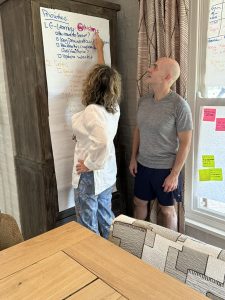
My Dimensions of Diversity (Natalie Spiro)
I am a woman with unique dimensions of diversity. Each aspect of my life contributes to a rich tapestry of experiences and perspectives. I
We’re driven by shared beliefs that allow us to work with all types of organizations across a wide range of industries to produce remarkable results.
A close-knit team with highly diverse backgrounds and skill sets, coming together with a singular purpose to deliver powerfully on your objectives and exceed your expectations.
To engage and retain talent in a rapidly evolving world, we must remain flexible and innovative in our approach to building and sustaining company culture.
Bringing in a professional coach is a smart path forward to unlock the potential observed in your leaders. Our certified coaches bring years of experience and can provide support and guidance. Empower and take your leaders to the next level.
We’re driven by shared beliefs that allow us to work with all types of organizations across a wide range of industries to produce remarkable results.
A close-knit team with highly diverse backgrounds and skill sets, coming together with a singular purpose to deliver powerfully on your objectives and exceed your expectations.
To engage and retain talent in a rapidly evolving world, we must remain flexible and innovative in our approach to building and sustaining company culture.
Bringing in a professional coach is a smart path forward to unlock the potential observed in your leaders. Our certified coaches bring years of experience and can provide support and guidance. Empower and take your leaders to the next level.

Originally published in Entrepreneur.
Technical skills alone are no longer enough to be a great leader.
Senior leaders, listen up: Soft skills are not soft; they are in fact critical. Experts have discussed this ad nauseum, and yet “heads of” still aren’t getting it. You are in charge of ensuring the future of your company is sustainable. That means you must plan for your future, and planning for your future means preparing your team.
Your team is your future. When you’re preparing for your team, yes, technical skills are vital. That said, remember, technical skills are learned, and as a senior leader you should surround yourself with people that are capable of doing the work. Your job is to listen, collaborate, plan, innovate and stay open-minded and humble. These are critical skills. There’s nothing soft about them.
As we settle into 2022, performance reviews will again become a priority for organizations. How will you balance and, more importantly, understand the symbiotic necessity as a leader to possess both technical and critical skills?
Technical skills alone are no longer enough to be a great leader
Let’s tackle “technical skills” first to more deeply understand why many leaders have a critical skill gap. When you accomplish getting hired for your first job, technical skills are paramount, whether you’re learning how to make the fries in the right oil, calculate your first margin formula or deliver that important report to a boss.
In the quintessential job market, technical skills become the benchmarks for success. You build on your successes and earn your promotions through growing these technical skills. You even attend conferences to learn more technical skills. Somewhere along the way, maybe someone says to you, “Being a great leader means being a great listener.” And WHAM! For the first time, maybe, someone gave you a piece of feedback that’s about a critical skill, not a technical skill.
Perhaps this example is a little exaggerated, but for many, I don’t believe it’s far off. It’s at this point that you might be 10 years or more into your career. This is why leadership-development experts have been pushing hard for organizations to find ways to start investing earlier (or at the beginning) of their employees’ professional journeys.
…“soft skills” are a combination of people skills, social skills, communication skills, character or personality traits, attitudes, mindsets and career attributes.
In the world of organization development and leadership coaching, what most people call “soft skills” are a combination of people skills, social skills, communication skills, character or personality traits, attitudes, mindsets and career attributes. In other words, fundamentally social and emotional intelligence capabilities that enable people to navigate their environment, work well with others, perform well and achieve their goals with complementing “hard skills.” So-called “soft skills” are, in essence human skills: connecting, engaging, influencing, opening minds and motivating the actions of others. And they are critical not optional.
True leaders do not treat these skills as “nice to have.” They treat them as necessary because they are all about the critical work of connecting, supporting and developing partners, peers and employees. In today’s environment, you simply cannot drive teams effectively nor thrive as a leader without them.
Let’s share an example of the skill of listening. It connects us and allows us to see other perspectives to make more informed and educated decisions. Listening allows others to feel heard, valued, and part of the team. All of this is nothing less than critical.
Related: 8 Soft Skills That Make You an Even Better Leader
A few other examples of critical skills that are required to accomplish success:
Remember that Critical Skills should be:
With the proper valuation of the aforementioned soft skills, success shouldn’t be that hard to come by.
A great way to start this work is with a culture assessment, gathering feedback as a first step in forming an effective plan for the work and transformations ahead.

I am a woman with unique dimensions of diversity. Each aspect of my life contributes to a rich tapestry of experiences and perspectives. I

Over the past year, in a coaching engagement, a client wanted to engage in inspiring and participating with their team to work together with more

In my professional life I was not lucky to have a mentor. I had people that supported me, gave me advice, and coached me, but